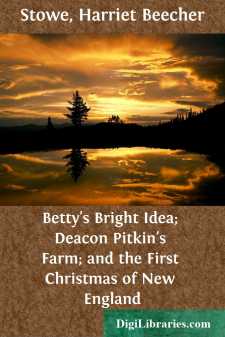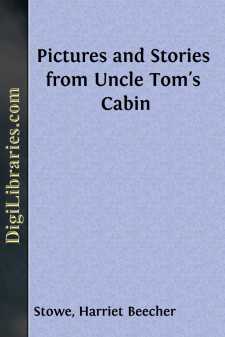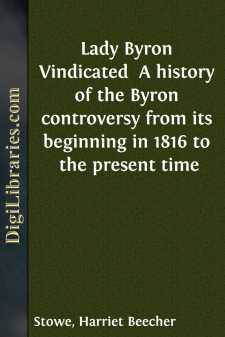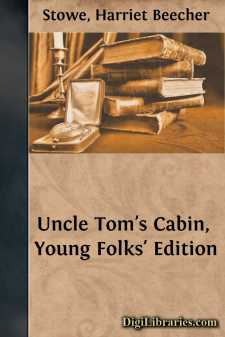Categories
- Antiques & Collectibles 13
- Architecture 36
- Art 48
- Bibles 22
- Biography & Autobiography 815
- Body, Mind & Spirit 144
- Business & Economics 28
- Children's Books 18
- Children's Fiction 14
- Computers 4
- Cooking 94
- Crafts & Hobbies 4
- Drama 346
- Education 58
- Family & Relationships 59
- Fiction 11833
- Games 19
- Gardening 17
- Health & Fitness 34
- History 1378
- House & Home 1
- Humor 147
- Juvenile Fiction 1873
- Juvenile Nonfiction 202
- Language Arts & Disciplines 89
- Law 16
- Literary Collections 686
- Literary Criticism 179
- Mathematics 13
- Medical 41
- Music 40
- Nature 179
- Non-Classifiable 1768
- Performing Arts 7
- Periodicals 1453
- Philosophy 65
- Photography 2
- Poetry 896
- Political Science 203
- Psychology 44
- Reference 154
- Religion 515
- Science 126
- Self-Help 85
- Social Science 82
- Sports & Recreation 34
- Study Aids 3
- Technology & Engineering 59
- Transportation 23
- Travel 463
- True Crime 29
Harriet Beecher Stowe
Harriet Beecher Stowe was an American author and abolitionist, best known for her novel "Uncle Tom's Cabin," published in 1852, which had a profound impact on attitudes toward African Americans and slavery in the United States. Her work fueled the abolitionist movement in the North and contributed to the tensions leading up to the Civil War. Stowe's writing, which often explored themes of social justice and human dignity, established her as a significant literary and social figure of the 19th century.
Author's Books:
Sort by:
CHAPTER I. FALLING IN LOVE. [Illustration: LILLIE.] "Who is that beautiful creature?" said John Seymour, as a light, sylph-like form tripped up the steps of the veranda of the hotel where he was lounging away his summer vacation. "That! Why, don't you know, man? That is the celebrated, the divine Lillie Ellis, the most adroit 'fisher of men' that has been seen in our...
more...
No description available
THE GHOST IN THE MILL "Come, Sam, tell us a story," said I, as Harry and I crept to his knees, in the glow of the bright evening firelight; while Aunt Lois was busily rattling the tea-things, and grandmamma, at the other end of the fireplace, was quietly setting the heel of a blue-mixed yarn stocking. In those days we had no magazines and daily papers, each reeling off a serial story. Once a...
more...
THE SALE OF LITTLE HARRY.Come read my book good boys and girlsThat live on freedom's ground,With pleasant homes, and parents dear,And blithesome playmates round;And you will learn a woeful tale,Which a good woman told,About the poor black negro race,How they are bought and sold. Within our own AmericaWhere these bad deeds are done,A father and a mother livedWho had a little son;As slaves, they...
more...
PART I. CHAPTER I. INTRODUCTION. The interval since my publication of ‘The True Story of Lady Byron’s Life’ has been one of stormy discussion and of much invective. I have not thought it necessary to disturb my spirit and confuse my sense of right by even an attempt at reading the many abusive articles that both here and in England have followed that disclosure. Friends have undertaken the...
more...
LETTER XIX. May 19. Dear E.:— This letter I consecrate to you, because I know that the persons and things to be introduced into it will most particularly be appreciated by you. In your evening reading circles, Macaulay, Sidney Smith, and Milman have long been such familiar names that you will be glad to go with me over all the scenes of my morning breakfast at Sir Charles Trevelyan's yesterday....
more...
I THE RAVAGES OF A CARPET “My dear, it’s so cheap!” These words were spoken by my wife, as she sat gracefully on a roll of Brussels carpet which was spread out in flowery lengths on the floor of Messrs. Ketchem & Co. “It’s so cheap!” Milton says that the love of fame is the last infirmity of noble minds. I think he had not rightly considered the subject. I believe that last infirmity is...
more...
CHAPTER I UNCLE TOM AND LITTLE HARRY ARE SOLD ERY many years ago, instead of having servants to wait upon them and work for them, people used to have slaves. These slaves were paid no wages. Their masters gave them only food and clothes in return for their work. When any one wanted servants he went to market to buy them, just as nowadays we buy horses and cows, or even tables and chairs. If the poor...
more...
And so I am to write a story—but of what, and where? Shall it be radiant with the sky of Italy? or eloquent with the beau ideal of Greece? Shall it breathe odor and languor from the orient, or chivalry from the occident? or gayety from France? or vigor from England? No, no; these are all too old—too romance-like—too obviously picturesque for me. No; let me turn to my own land—my own New...
more...
CHAPTER I In Which the Reader Is Introduced to a Man of Humanity Late in the afternoon of a chilly day in February, two gentlemen were sitting alone over their wine, in a well-furnished dining parlor, in the town of P——, in Kentucky. There were no servants present, and the gentlemen, with chairs closely approaching, seemed to be discussing some subject with great earnestness. For convenience sake,...
more...











